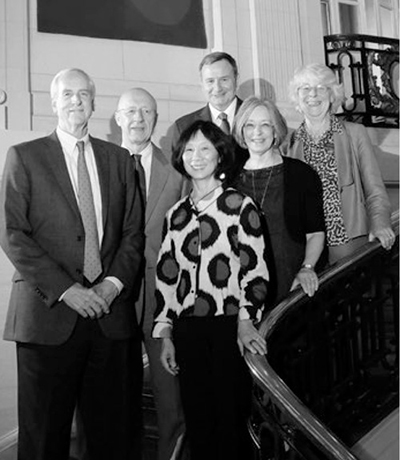On June 23–24, 2014, the American Academy and the British Academy held a joint conference in London that examined the state of humanities research and education in an international context. The conference concluded a year in which both academies published major reports on the humanities and social sciences: the American Academy’s Heart of the Matter report and the British Academy’s Prospering Wisely white paper.
 |
| Hunter Rawlings (Association of American Universities), Pauline Yu (American Council of Learned Societies), Robin Jackson (British Academy), Diane P. Wood (United States Court of Appeals for the Seventh Circuit), Karl W. Eikenberry (Stanford University, former U.S. Ambassador to Afghanistan, U.S. Army Lieutenant General, ret.), and Dame Helen Wallace (British Academy) |
The conference, entitled “Broadening the Debate: How the Humanities and Social Sciences can help us address global challenges,” was the first official collaboration between the two academies in a century.
Diane P. Wood – Chief Judge of the United States Court of Appeals for the Seventh Circuit, Chair of the Academy Council, and member of the Academy’s Commission on the Humanities and Social Sciences – led a U.S. delegation that included Commission members Karl W. Eikenberry, former U.S. Ambassador to Afghanistan and retired U.S. Army Lieutenant General; Hunter Rawlings, President of the Association of American Universities; and Pauline Yu, member of the Academy Council and President of the American Council of Learned Societies. The American delegation also included representatives of the National Endowment for the Humanities, the National Humanities Alliance, the American Council on Teaching Foreign Languages, and the American Councils for International Education, among others.
Participants from the British Academy included Nicholas Stern (Lord Stern of Brentford), President of the British Academy; Dame Helen Wallace of the London School of Economics and Political Science; Jonathan Bate, Provost of Worcester College, Oxford; and Nigel Vincent of the University of Manchester. In all, over two hundred Fellows of both academies attended the two-day conference.
In a preliminary statement, Don Randel, Chair of the Academy Board, said, “Independently, our academies have been working to inspire greater support for the humanities and social sciences as disciplines vital to our respective nations. This joint conference gives us an opportunity to explore these topics together and, for the first time, to speak with a unified voice about the importance of humanistic pursuits to a well-functioning society.”
The first day of the conference featured two panel discussions before an invited audience that included scholars, policy-makers, and teachers. The first panel addressed “Why a Coordinated Approach to the Humanities, Social Sciences, and Natural Sciences Matter.” Yu asserted that “the humanities and sciences are necessarily complementary” since there are “a range of human problems that cannot be defined as strictly scientific,” and she stressed the importance of a broad liberal arts education at the undergraduate level to create a pipeline of scholars prepared to address future challenges.
During the second panel, “Promoting Opportunity through Education,” Rawlings offered an impassioned plea for new approaches to teaching, stressing the need for active student engagement that draws on the tradition of philosophical and academic dialogue founded by Plato in the 4th century BCE.
The focus of the second day of the conference was a roundtable discussion cosponsored by the British Academy and The Guardian as part of their ongoing collaboration on “The Case for Language Learning.” Discussants, including the entire American delegation, addressed the importance of language learning in national and international policy as well as best practices in language education. Proceedings of the roundtable, moderated by Guardian columnist Will Hutton, were published in an online edition of the newspaper on July 7. The article, entitled “Lack of languages stifles Brits and Americans,” captures many of the themes of the two-day conference and is, in effect, the first product of collaboration between the two academies.
Transcripts of the discussion will inform a British Academy white paper that will be published in early 2015. Several language initiatives in the United States will also draw on the proceedings as inspiration for continuing efforts, including the Language Enterprise Initiative.
The conference concluded with a public event, “Global Power, Influence, and Perception in the 21st Century,” featuring Eikenberry; Sir Adam Roberts, former President of the British Academy and a Foreign Honorary Member of the American Academy; and Sir Martin Davidson, Chief Executive of the British Council. The speakers discussed the importance of the humanities and social sciences to “soft power,” the cultural and persuasive influence of nations like the United States and the United Kingdom. “Soft power is about culture, it’s about values, and it’s about smart, nuanced foreign policy,” Eikenberry said. “And I would argue that its strength lies in the arts, the humanities and the social sciences.” Bridget Kendall, diplomatic correspondent for the BBC, moderated the conversation.
Video of the events is available at www.humanitiescommission.org.
Following the conference, leaders of the British Academy and American Academy discussed future collaborations, including more frequent correspondence on issues of mutual concern, scholar exchanges, and the possibility of biannual joint conferences.
Although the two academies share a concern for the strength and vitality of intellectual life in their respective nations, contact between them has been minimal: prior to the June conference, the last recorded contact between the two academies was a publication exchange in 1914.